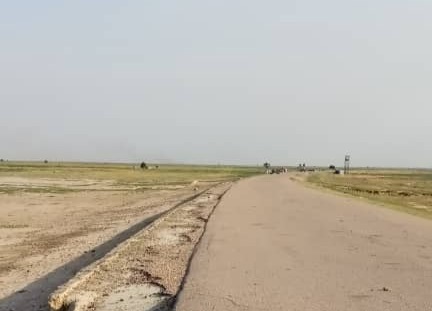The busiest commercial route linking Nigeria’s northeast to Cameroon, Chad and the Niger Republic has become a highway to hell.
Insurgents have turned the 138km Maiduguri-Dikwa-Mafa-Gamboru Ngala road into a highway to hell by planting more improvised explosive devices (IEDs), killing and wounding traders, drivers and passengers.
Since last month at least five people, including security personnel, have been killed and seven wounded when their vehicles drove over the IEDs, detonating them.
Now, traders, drivers and passengers alike are terrified of travelling on the road, which is one of the busiest and most popular commercial routes linking Nigeria’s northeast sub-region to Cameroon, Chad and the Niger Republic.
But in August and this month there has been a spike in the number of IEDs found on the road and people are becoming increasingly scared of using it.
The latest mine explosion occurred on Monday, September 18, between Dikwa and Gamboru. At least three people were killed and three wounded.
Modu Gwal, a civilian joint task force member (CJTF) in Dikwa, confirmed the road was not safe and said they had discovered “more than usual” IEDs that had been planted by insurgents.
“Fortunately, we [CJTF] members and soldiers discovered and removed the IEDs before motorists detonated them. We have found many more IEDs in the past two months, including September, than before.”
“On three other occasions, we did not discover the IEDs. The explosions claimed the lives of three soldiers, their driver and a CJTF member. At least seven were wounded.”
Gwal told RNI that the first mine explosion occurred on August 6. A military vehicle drove over the mine. Three soldiers and their driver were killed.
He said the second occurred in mid-August when a civilian’s car drove over an IED. Luckily, no one was killed in the explosion but two people were wounded.
“The latest mine explosion occurred on Monday [September 18] involving a military vehicle and a CJTF patrol van following closely behind it. One soldier and a CJTF member died in the blast. Five others, including a CJJTF member, were wounded.
“The insurgents ambushed us and detonated the IED when we got to the spot where they had planted it. We exchanged fire with the insurgents, but there were too many of them and they outnumbered us. They stole our vehicles.
“Some of us were left unconscious after the blast. When we regained consciousness, we decided that we would not let the insurgents get away with their abominable acts and we decided to follow them. There was fierce gunfire but this time around we were able to retrieve our vehicles and we also seized insurgents’ motorbikes as they fled on foot.”
Gwal said that in the past two weeks, the CJTF and soldiers had enlisted the help of surrendered insurgents to help clear the road which was “laden with mines”.
“We have been conducting many more patrols on the road and we have been able to find many IEDs. We are sure that there will be fewer casualties on the road from now on.
“But,” he said, “we need the government to provide CJTF members with more weapons, ammunition, patrol vehicles and tricycles. That’s the only way to put an end to this scourge. At present, we have only two patrol vehicles and a few old motorbikes that we seized from the insurgents.”
Modu Ali, a commercial driver from Dikwa, told RNI that insurgents had been planting mines on the road for some time.
“But it has got worse recently, particularly along the Bakasi and Dikwa part of the road. I regularly drive people from Dikwa to Maiduguri and I have noticed a reduction in the number of motorists using the road. Most of the motorists who use this road fear for their safety.
“As a driver, it is God’s mercy that has kept me alive during these months.”
Ali said the government should provide the CJTF with armoured vehicles so that they could protect people using the road. He said surveillance should be carried out at night, particularly, because that was mostly when the insurgents planted the IEDs.
Ya Falta Dikwama, a businesswoman who uses the Dikwa, Gamboru and Maiduguri road frequently for her work, said the worst part of the road was from Dikwa to Ajire.
“That is where the insurgents have planted a number of IEDs. I use the road almost every day either in the morning or in the afternoon. It used to be safe to travel. But, unfortunately, with the frequent mine explosions, I am scared of using that route. So scared, in fact, that I have stopped travelling there. I will only go that way when the road is safe again.”
The Maiduguri-Dikwa road connects Gamboru, Ngala and the Mafa Local Government Area, which is the economic hub in the state. It is also the best way to get to areas in the Lake Chad region and to get to neighbouring Cameroon, Niger and Chad.
It was first closed to motorists in 2013 at the peak of the insurgency. In 2016 it was reopened but because of insecurity it was closed again.
Borno State governor Babagana Umara Zulum reopened the road last year. At the time he was quoted as saying: “The Gamboru Ngala-Maiduguri Road was closed because of the insurgents; however, the road was reopened three years ago with limited access. This morning, we are witnessing the reopening of the road from Maiduguri-Dikwa to Gamboru Ngala with unlimited access.”
He said the government had provided millions of naira and necessary logistics to support the Nigeria Armed Forces and other security agents in their surveillance activities along the axis.
He appealed to motorists, particularly commercial drivers using the Dikwa-Gamboru Ngala road, to be law abiding by observing traffic regulations and obeying the instructions of security operatives along the road.
Gwal told RNI that because the road was no longer safe, “the government needs to tackle insecurity on that route again. It is genuinely needed.”
FALMATA MOHAMMED ALI








